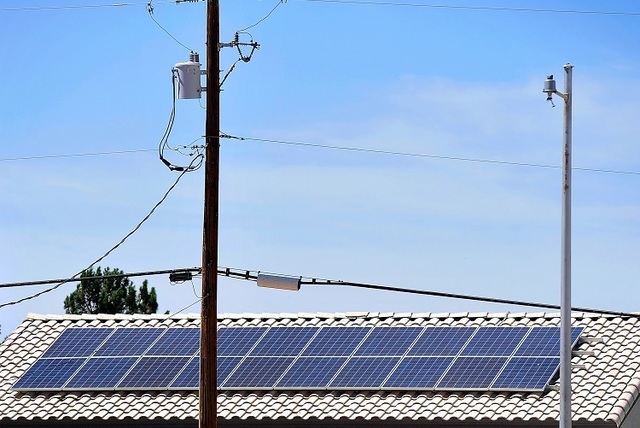Rooftop-solar workers show concern over potential job loss


CARSON CITY — Rooftop-solar industry workers turned out in force Friday at the Nevada Public Utility Commission offices in Las Vegas to express concerns that their jobs could soon disappear.
A cap on "net metering" where residents who install rooftop solar can receive a credit from the utility company for any excess energy generated, could be reached as soon as August. Without action by the PUC, the industry could grind to a halt, affecting 6,000 jobs, rooftop solar officials said.
About 150 solar workers attended a meeting of the PUC and used the public comment portion of the meeting to urge commissioners to quickly take action. The issue was not formally before the commission at its meeting.
Louise Helton, owner of 1 Sun Solar Cos. in Las Vegas, asked the commission to take action on a petition filed with the agency to ensure the solar industry does not grind to a halt if the net metering cap is reached before the end of the year.
Action is critical for companies trying to install solar panels through the remainder of 2015, she said.
SolarCity employee Blake Guinn, a grandson of the late Gov. Kenny Guinn, asked commissioners to raise the net metering cap. Thousands of people have installed rooftop solar because they want the option, he said.
Nevada led the nation in solar job growth in 2014, Guinn said. It would be a shame if Nevada led the nation in solar job losses in 2015, he said.
The 2015 Legislature passed a measure to address the net metering cap by directing state utility regulators to craft a new policy on rooftop-solar installations by Dec. 31. But lawmakers were originally told the 3 percent cap, which was changed to an equivalent 235 megawatt cap, would not be reached until next year.
Now NV Energy, which operates in Southern Nevada as Nevada Power Co., recently reported that the cap could be reached sometime in August, prompting the solar industry to ask the PUC to take action.
The Alliance for Solar Choice has petitioned the PUC to clarify matters to prevent layoffs and disruption in the industry while it crafts a new rooftop-solar policy. Without a new rooftop-solar policy or an interim solution, the industry‘s jobs could dry up, the alliance said.
Rooftop-solar companies fought hard in the 2015 session to raise the cap to as high as 6 percent or more, but lawmakers rejected the proposal, asking the PUC to resolve the issue instead. Lawmakers want the PUC to help ensure rooftop solar remains economically viable without any subsidy from nonnet metering customers.
Contact Sean Whaley at swhaley@reviewjournal.com or 775-687-3900. Find him on Twitter: @seanw801












